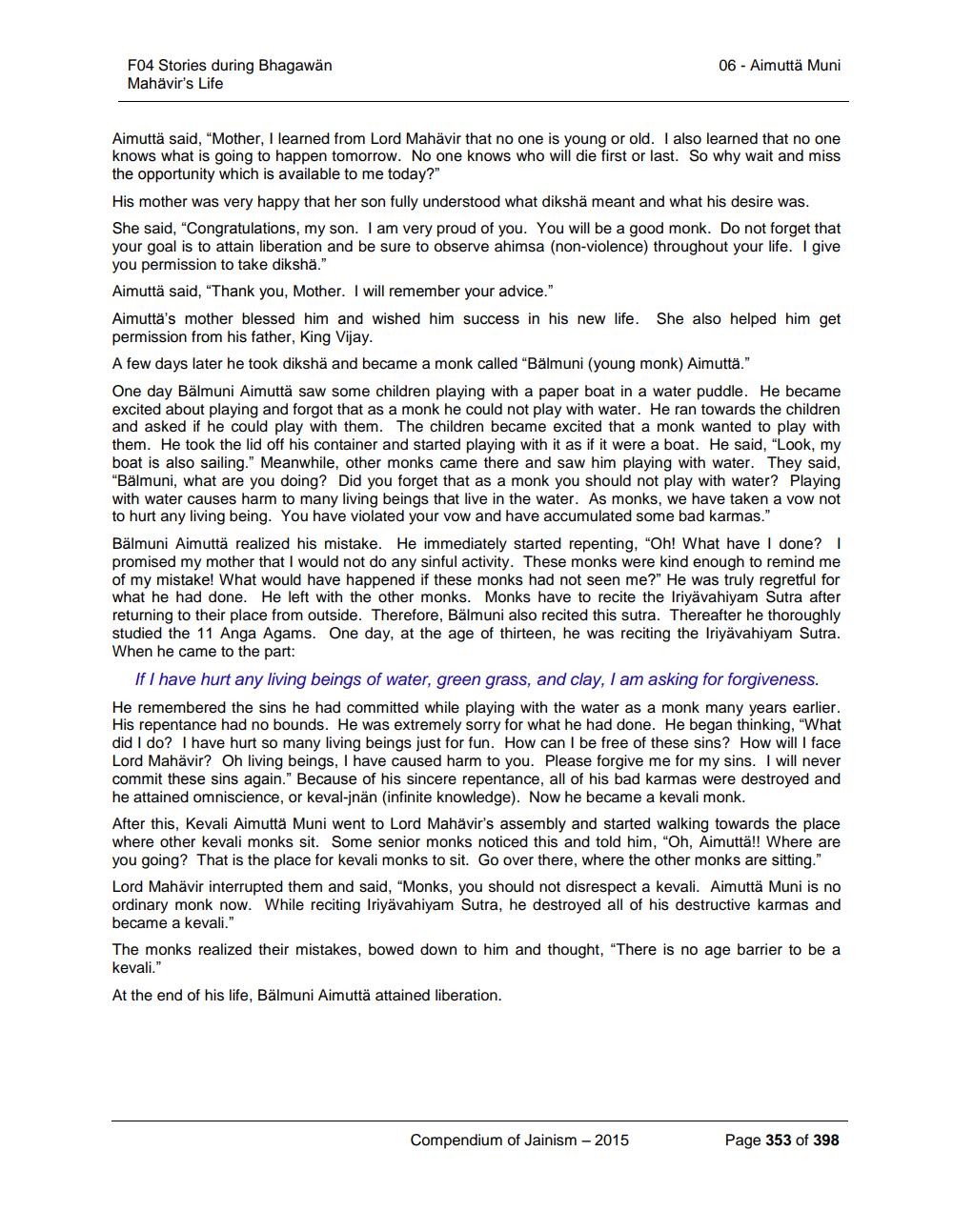________________
06 - Aimuttä Muni
F04 Stories during Bhagawan Mahävir's Life
Aimuttä said, "Mother, I learned from Lord Mahävir that no one is young or old. I also learned that no one knows what is going to happen tomorrow. No one knows who will die first or last. So why wait and miss the opportunity which is available to me today?" His mother was very happy that her son fully understood what dikshä meant and what his desire was. She said, "Congratulations, my son. I am very proud of you. You will be a good monk. Do not forget that your goal is to attain liberation and be sure to observe ahimsa (non-violence) throughout your life. I give you permission to take diksha." Aimuttä said, "Thank you, Mother. I will remember your advice." Aimutta's mother blessed him and wished him success in his new life. She also helped him get permission from his father, King Vijay. A few days later he took dikshä and became a monk called "Bälmuni (young monk) Aimuttä." One day Balmuni Aimuttä saw some children playing with a paper boat in a water puddle. He became excited about playing and forgot that as a monk he could not play with water. He ran towards the children and asked if he could play with them. The children became excited that a monk wanted to play with them. He took the lid off his container and started playing with it as if it were a boat. He said, "Look, my boat is also sailing. Meanwhile, other monks came there and saw him playing with water. They said, "Bälmuni, what are you doing? Did you forget that as a monk you should not play with water? Playing with water causes harm to many living beings that live in the water. As monks, we have taken a vow not to hurt any living being. You have violated your vow and have accumulated some bad karmas." Bälmuni Aimuttä realized his mistake. He immediately started repenting, "Oh! What have done? promised my mother that I would not do any sinful activity. These monks were kind enough to remind me of my mistake! What would have happened if these monks had not seen me?" He was truly regretful for what he had done. He left with the other monks. Monks have to recite the Iriyavahiyam Sutra after returning to their place from outside. Therefore, Bälmuni also recited this sutra. Thereafter he thoroughly studied the 11 Anga Agams. One day, at the age of thirteen, he was reciting the Iriyavahiyam Sutra. When he came to the part:
If I have hurt any living beings of water, green grass, and clay, I am asking for forgiveness. He remembered the sins he had committed while playing with the water as a monk many years earlier. His repentance had no bounds. He was extremely sorry for what he had done. He began thinking, "What did I do? I have hurt so many living beings just for fun. How can I be free of these sins? How will I face Lord Mahävir? Oh living beings, I have caused harm to you. Please forgive me for my sins. I will never commit these sins again." Because of his sincere repentance, all of his bad karmas were destroyed and he attained omniscience, or keval-jnän (infinite knowledge). Now he became a kevali monk. After this, Kevali Aimuttä Muni went to Lord Mahävir's assembly and started walking towards the place where other kevali monks sit. Some senior monks noticed this and told him, "Oh, Aimutta!! Where are you going? That is the place for kevali monks to sit. Go over there, where the other monks are sitting." Lord Mahävir interrupted them and said, "Monks, you should not disrespect a kevali. Aimuttä Muni is no ordinary monk now. While reciting Iriyavahiyam Sutra, he destroyed all of his destructive karmas and became a kevali." The monks realized their mistakes, bowed down to him and thought, “There is no age barrier to be a kevali." At the end of his life, Bälmuni Aimuttä attained liberation.
Compendium of Jainism - 2015
Page 353 of 398




